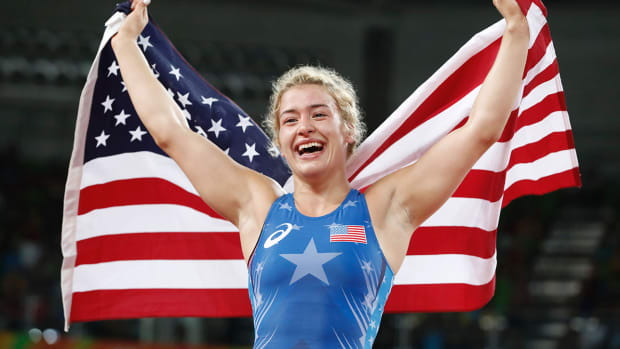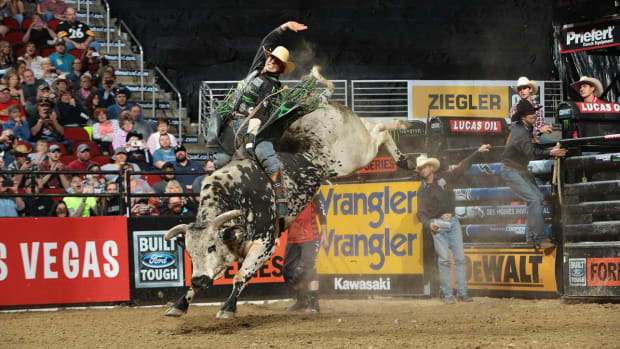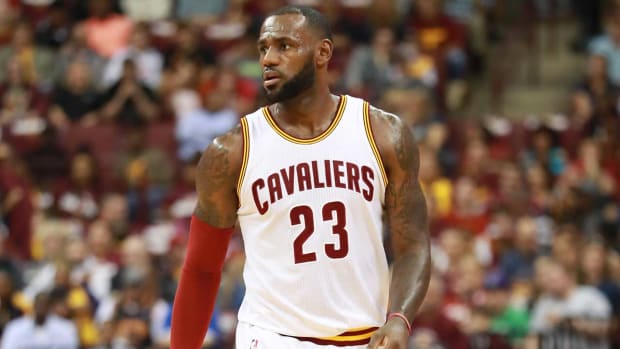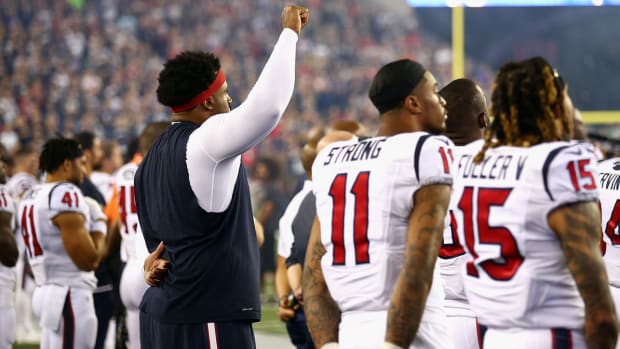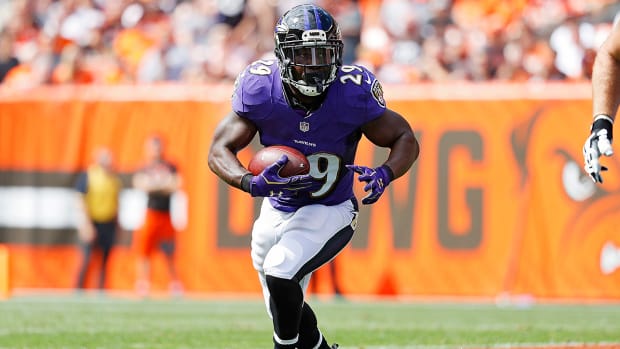Broken men and NFL's broken system: Why life after the game is so difficult
What do you do when your life turns upside down? When the very framework by which you’ve defined yourself, for the majority of your life, falls away? How does a human being cope with such a drastic change in circumstances?
In October 2012, ESPN Films' 30 for 30 ran an episode titled Broke, which took an eye-opening look at the many ways professional athletes lose their money. The sheer numbers were shocking to people unfamiliar with what goes on behind the scenes of an athlete’s life: Seventy-eight percent of NFL players broke within just two years of ending their careers. Sixty percent of NBA players broke within five.
Recurring themes linked the stories of those profiled: Profligate spending on cars, houses, family and friends — the money that was meant to last a lifetime, burned and gone. As important a work as Billy Corben’s Broke was, it was focused on the financial turmoil in players’ lives; the means by which a man and his money are soon parted. Unfortunately, there is another, deeper cause of the overwhelming failure of athletes once they leave their game, and it’s one that still hasn’t been addressed, even three years later.
There is a psychological scarring endemic to those who’ve defined themselves by a very specific worldview, who have built their lives around a foundation they felt was forever, and then watched helplessly as it was stripped away. It is inherent in the transition from the ephemeral life of the athlete to the rock-solid life of the everyday, and the sad reality is that the majority of those who share the experience emerge broken, primarily because no one guides them through the change.
A life inside the NFL is a curious thing. During the season, your days are regimented, tightly scheduled. Get up at this hour. Eat at that hour. Practice during these hours. Show up here for the bus, there for the plane, and you better not be late. A life is easily constructed around these rules, and one knows what one’s responsibilities are. There is a comfort in routine, a sense of easy familiarity. The paycheck comes in on this day, the game is on that day, and at all times, you know where you belong.
The off-season is a bit tougher, as now your schedule covers weeks instead of days, but there are still plenty of checkpoints. This date marks the start of spring conditioning. That date marks OTAs. Minicamps here, final break there, fall camp and we’re back into the season. The structure remains, ticking regularly as clockwork.
And then, one day, you’re done.
You take an exit physical, you go home, wherever that might be, and the days stretch before you. The structure of your life for what has most likely stretched for at least a decade is now gone, vanished as if it never existed at all. No one tells you what to do now. No one helps you figure out a new routine.
And why would they? They’re too busy making sure whoever replaced you knows the routine you just left. Believe it or not, the NFL actually has what it calls a “Transition Assistance Program,” but that’s only for players who know it’s there (I received no mention of it when I finished playing), and it appears to be more like a single seminar than actual, meaningful one-to-one conversation over a period of months or years.
This is where athletes break.
Those athletes with an intense drive to be the best, no matter the cost, are now unsure what to strive for. A willingness to ignore risks, both physical and mental, now adrift in a vast ocean of temptation. You couldn’t get drunk every day of the week before, because that would’ve affected your play on the field, but now? What’s to stop you, especially with the pain in your joints? There’s no coach to warn you about stepping out of line, that your focus is slipping. There’s no locker room filled with teammates you can bullshit with about the small problems before they turn into big problems. It’s just you and probably your partner, who’s trying to adjust to the change as well.
Sadly, many former players and their loved ones don’t adjust. In fact, many will end up divorced, the transition too difficult to adjust to, a life of love now reduced to screaming about medical bills, lack of sustainable income and who contributes what to the household. You can’t spend money like you used to, because the paychecks aren’t coming in anymore, but do you recognize that in time? Friends and family think you’ve made enough to fund anything they want to do — you’re the big-shot athlete, after all. Can you doff that persona and tell them ‘No,’ that your money needs to last? Kids get caught in the crossfire, their lives affected as well; a nasty mess all around. And through it all, the league and the unions shrug and wash their hands. “Not our problem,” they say. “We’re concerned about current players,” they say. “Find yourself a support system.” “Pay your way to our seminar.”
But why, if the powers that be know that every player is going to transition out of the league at some point; if they know that the odds are against those players, and that almost all of them will end up a tragedy instead of a triumph; why, then, haven’t these multi-billion-dollar leagues created and promoted a universal support systems to help all players transition from their old lives to their new ones? Why is there no required series of steps upon exiting the game?
Half of the players in the NFL won’t even qualify for pension benefits in the first place, so there’s no safety net waiting for them when they get older. How is it possible, given everything we know, that there is no sense of corporate responsibility toward those who literally sacrifice their bodies and minds to bring in record-breaking revenue, even if they only play for a year or two?
After all, the players are the product on the field. They provide the incentive for fans to watch. So why are they kicked to the curb the instant they’re deemed no longer physically useful? When a player enters the league, there is session after session about the responsibilities as a professional athlete. The responsibilities to the fans. To the media. To the team, and the owners. When you are part of an NFL team, there exists an entire network of assistance, from sports psychologists to team nutritionists, all designed to maximize your value within the structure of football. People to tell you everything you need to do, until you’re no longer useful to them — and then they’re gone.
Why is there no real support system for players on the way out? To help them navigate the complexities of the real world now that they’re no longer in their bubble, to help them devise a new routine by which they can shape a new life? Where is the Rookie Symposium for retiring veterans, easily accessible to all who have played? Where is the marital counseling, the psychiatric advisors, the financial planners who aren’t thieves and grifters?
The only answer I can think of is the callous greed of those who simply don’t care. Those who see a human being as just another commodity to be used up and discarded once it no longer functions. After all, the NFL and the NFLPA have no legal obligation to help former players transition to their new life as not-athletes. Older players had to fight for years simply to get medical benefits. The concussion lawsuit is still ongoing. The players already got their money when they played, the league seems to believe. The contracts were legally honored, according to the fine print. Why can’t these ex-players just figure it out on their own?
Some will. Some will make their way to a new life, redefine who they are through a lens that isn’t their sport. The truth is, however, that most won’t. The data is out there, and the reality is stark.
Athletes will continue to flame out once retired, unless something more is done to help them. The professional sports leagues owe it to the people whose bodies they consume. They owe it to help prevent another Dave Duerson, another Junior Seau; perhaps not legally, not under our current laws, but ethically. Because a human being shouldn’t be left to an assured path of self-destruction when resources are there to prevent it.
Professional sports owe it to their players to help them find new structures in their lives; to help them transition back to the realities of the “real world.” Fans should demand accountability from the businesses they patronize for entertainment, not just for those players who are currently participating, but for those who’ve left the games behind. Contact your teams, your leagues, and ask them to help athletes find structure when the only one they’ve known is gone.
Otherwise, players, both men and women, will continue to depart the game broken. We cheer for them when they enter the field. Our silence when they leave is deafening.

